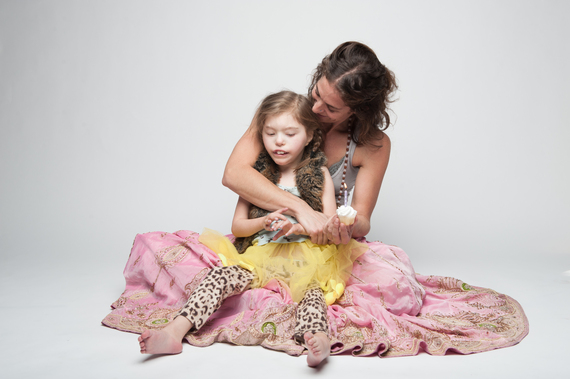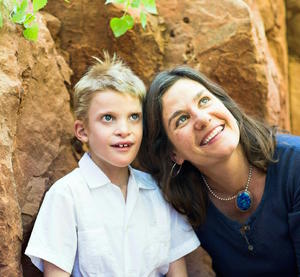Parenting pulls us into the widest range of human emotion and experience: joy, exhaustion, love, frustration, miracles and milestones, and everything in between.
At the same time, parenting is a practice in finding peace in routine. The daily tasks repeat over and over - picking up toys, reading stories, helping with homework, carpooling. Grounding and comforting on some days, frustrating and mundane on others, these routines become the ordinary of our lives.
This is true for us as well. We each have a child who is cognitively disabled in the moderate-to-profound range, where only a 15% minority of cases lie. One is a girl, one a boy. One is 14, and the other turns 8 this summer. One can walk and eat independently. The other is wheelchair bound and needs assistance with all tasks in life.
People often view our lives as extraordinary, but perhaps they are more ordinary than others realize. We spend time in the mornings making breakfasts and lunches, getting ready for the day. We drive the kids to school or bring them to the bus stop. We head off to do our own work in the world. In the afternoons, we take our children to swimming and soccer, to school events and appointments. In the evenings, we play in the yard, walk our puppy around the neighborhood, watch the sun set, read Curious George. We have dinner, take baths, and wind down for bedtime. We have off days, grumpy days, tired days, and beautiful days.
However, there are other times when the extraordinary of being a parent weighs heavily on our minds and hearts. Those days are harder.
While making scrambled eggs or smoothies in the morning, we are aware of the child we must still feed. When routines break down and the feeding tube leaks or the spoon is hurled across the room, the ordinary can start to feel extraordinary.
All children need assistance in their preschool years. As a parent there is a poignant relief knowing that one day our help will no longer be needed to get a child dressed, brush her teeth, go to the bathroom. As mothers of children who may never be independent, we must approach these daily tasks with enormous patience and stamina - and realize that some of the tasks only become harder as a child grows older, weighs more, gets taller, resists our efforts.
We can feel suspended in time in an existentially unsettling way when we dwell on the fact that teething and drooling, Elmo and Thomas, and pull-ups and bottles are still in our lives. Our children are not riding bikes or reading Harry Potter. Not now. Not ever?
Despite their many differences, our two children share some passions. They enjoy playing in water - the sound of splashing and the feeling of buoyancy. They love listening to music. They delight in the company of other children, though neither of our children can use language to communicate.
People are understandably curious and ask well-meaning questions. Sometimes the hardest are the blunt ones that come from children. How old is she? Did he pass kindergarten? Why can't they talk yet?
A common question from adults: Where does your child go during the day? It is a reminder that others seem to not realize how much of our experience is the same as theirs. Our children go to school! The Individuals with Disabilities Education Act (IDEA) ensures that. We are grateful for the dedicated, caring, and skilled teachers and staff who guide our children's learning, take care of their physical needs, and help them navigate each minute of the school day.
While school is a steady constant we rely on, the IDEA does not guarantee us dedicated aides at restaurants or on airlines, nor does it secure invitations to play dates, sleepovers, and birthday parties. No one expects to include our children in a carpool or bring them to the movies. Extracurricular activities like flag football and gymnastics are hard to access - and for medically fragile children, afterschool time can be consumed with appointments.
Heading out for a family outing like a hike or a picnic requires paved trails and luck that everything aligns, including a child's patience, the shade of the stroller, and the perfect distance. We need to plan and pack for contingencies and accept that our excursion might be a disaster.
All parents have days that leave us so tumbled we yearn to be in bed by 8. When that can happen, ordinary is the respite of a deep sleep. But our children don't always sleep through the night. Their restlessness could be gas or asthma or the start of a seizure. There are terrifying and lonely moments when we find ourselves staring down death.
The aphorism "It takes a village to raise a child" is as true for us as it is for all parents. Research shows that parents raising special needs children especially need a network that goes beyond the nuclear family. But in the reality of responsibilities, logistics, comfort levels and skill sets, our village often feels smaller than we'd like.
When we are feeling most vulnerable in public, we can't help but imagine the unspoken thought of a stranger: "There but for the grace of God go I." We realize our children cause others to wonder, worry, have pity, turn away. But there is great harm in looking away. We need people to get more comfortable with their own discomfort, to recognize the universal in our experience.
We don't need sympathy. Hearing "You are so strong," "You are doing such a good job despite the circumstances," "It must be so hard," doesn't help. These words create an incredible sense of alienation, as if the speaker is in some other distant world observing ours from afar.
In fact, we are in the same world. Like all parents, we find moments in the rhythm of the ordinary to pause and relax, and when faced with the extraordinary, try to greet it head on with grace.

